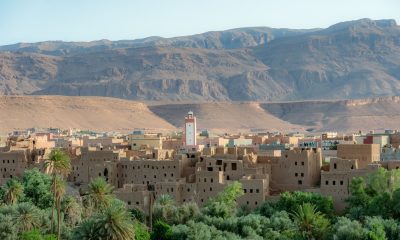Africa
IMF Places São Tomé and Príncipe and Mozambique among Countries that Need to Restructure Debt
Zambia was the first African country to move towards debt restructuring under the Common Framework, a mechanism created following the Debt Service Suspension Initiative (DSSI) in April 2020, at the height of the COVID-19 pandemic. IMF has revised downwards by 0.3 points the growth forecast for sub-Saharan African economies as a whole, from 4% in 2022 to 3.3% this year, recovering again in 2024 to 4%

São Tomé and Príncipe and Mozambique are among the eight African countries that the director of the African Department of the International Monetary Fund (IMF) believes should restructure their debt.
“The countries are the Republic of Congo, Eritrea, Ghana, Malawi, Mozambique, São Tomé and Príncipe, Zimbabwe, and Zambia,” an official IMF source told Lusa, after the director of the African department said in an interview with the Bloomberg financial information agency that there were eight African countries that, given the unsustainability of their debt, should move towards restructuring.
“In sub-Saharan Africa, the picture is really very varied,” Abebe Selassie told Bloomberg, adding: “The number of countries where the debt is unsustainable and that need to restructure is seven, or eight, now; in most other cases what we see is an increase in debt vulnerabilities.”
Read more about the IMF annual assessment of each country’s debt and find the latest economic news of the day with the Born2Invest mobile app.
The inclusion of São Tomé and Príncipe and Mozambique on this list is the result of the IMF’s annual assessment of each country’s debt
That is the Debt Sustainability Analysis (DSA), which includes various indicators, such as the ratio of debt to GDP, or the percentage of tax revenue that is used to pay off the debt.
This is why São Tomé and Príncipe appear on the list, as it doesn’t even have one of the highest public debts in terms of comparison with GDP: the Lusophone archipelago, for example, has only 58.5% debt to GDP, while Cape Verde, with 113.1% debt, is not on the list, as most of its debt is concessional (with interest rates well below the market) and therefore doesn’t pose any sustainability problems.
Zambia was the first African country to move towards debt restructuring under the Common Framework, a mechanism created following the Debt Service Suspension Initiative (DSSI) in April 2020, at the height of the COVID-19 pandemic.
On Thursday, the IMF’s managing director went so far as to say that Zambia had signed the memorandum of understanding with the creditors, but ended up having to correct the information, as the agreement is only expected to be signed in the next few days, according to the IMF.
In the face of criticism about the slowness of the process, the IMF has said that the restructuring agreements are moving faster and has repeatedly stated that, in terms of an agreement with creditors, the sooner the better.
IMF has revised downwards by 0.3 points the growth forecast for sub-Saharan African economies as a whole, from 4% in 2022 to 3.3% this year, recovering again in 2024 to 4%
“Russia’s war in Ukraine has triggered an inflationary shock that has led to an increase in the number of people experiencing severe food insecurity, a slowdown in international demand, higher financing costs, and new exchange rate pressures,” reads the report on the Regional Economic Outlook for sub-Saharan Africa, released in Marrakech, where the IMF and World Bank annual meetings are taking place.
In April, the IMF forecast growth in the region of 3.6% this year and 4.2% next year. In its July update, the IMF revised its forecasts to 3.5% and 3.9% growth this year and next.
Countries with the highest debt-to-GDP ratio
Angola………….. 84,9
Cape Verde………. 113,1
Republic of Congo 97,8
Ghana……………. 84,9
Mozambique………. 89,7
Senegal…………. 81
Sierra Leone………. 88,9
Zimbabwe………….95,4
Average for the region……60,8
__
(Featured image by Towfiqu barbhuiya via Unsplash)
DISCLAIMER: This article was written by a third party contributor and does not reflect the opinion of Born2Invest, its management, staff or its associates. Please review our disclaimer for more information.
This article may include forward-looking statements. These forward-looking statements generally are identified by the words “believe,” “project,” “estimate,” “become,” “plan,” “will,” and similar expressions. These forward-looking statements involve known and unknown risks as well as uncertainties, including those discussed in the following cautionary statements and elsewhere in this article and on this site. Although the Company may believe that its expectations are based on reasonable assumptions, the actual results that the Company may achieve may differ materially from any forward-looking statements, which reflect the opinions of the management of the Company only as of the date hereof. Additionally, please make sure to read these important disclosures.
First published in Africa 21 Digital. A third-party contributor translated and adapted the article from the original. In case of discrepancy, the original will prevail.
Although we made reasonable efforts to provide accurate translations, some parts may be incorrect. Born2Invest assumes no responsibility for errors, omissions or ambiguities in the translations provided on this website. Any person or entity relying on translated content does so at their own risk. Born2Invest is not responsible for losses caused by such reliance on the accuracy or reliability of translated information. If you wish to report an error or inaccuracy in the translation, we encourage you to contact us.

-

 Business2 weeks ago
Business2 weeks agoTopRanked.io Weekly Affiliate Digest: What’s Hot in Affiliate Marketing [Hosting.com Affiliates]
-

 Crypto7 days ago
Crypto7 days agoEthereum Pushes AI Integration With ERC-8004 and Vision for Autonomous Agents
-

 Biotech2 weeks ago
Biotech2 weeks agoByBug Turns Insect Larvae into Low-Cost Biofactories for Animal Health
-

 Business2 days ago
Business2 days agoDow Jones Near Record Highs Amid Bullish Momentum and Bearish Long-Term Fears

























